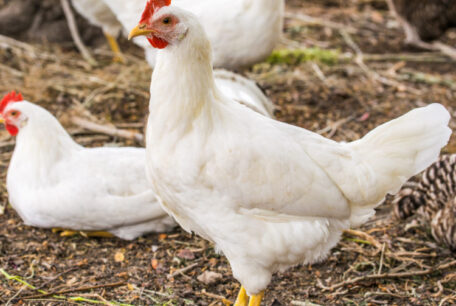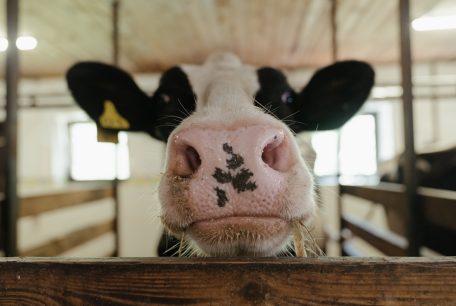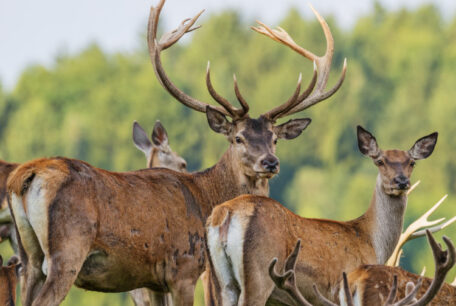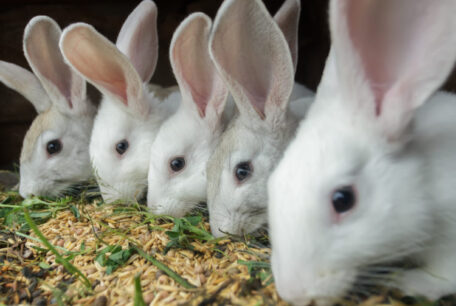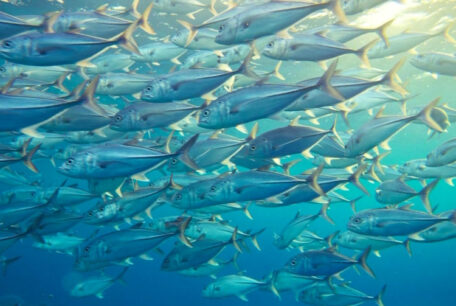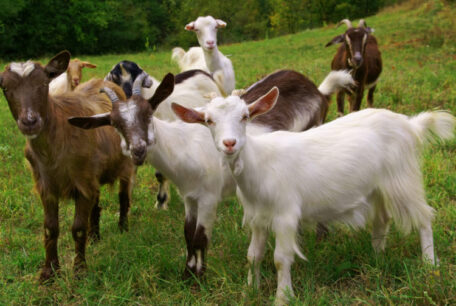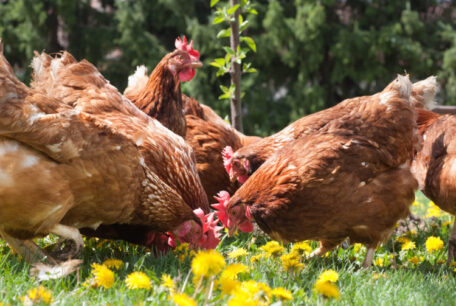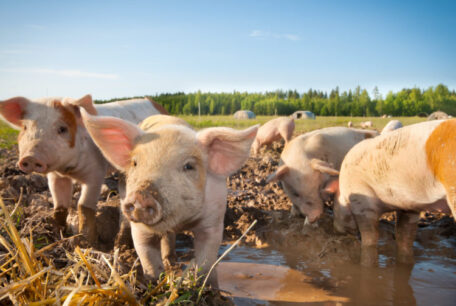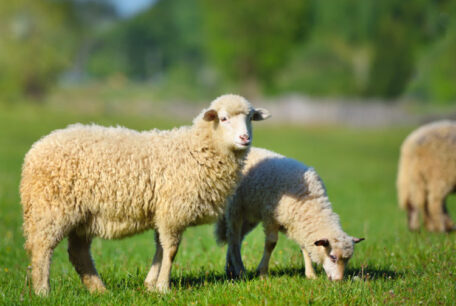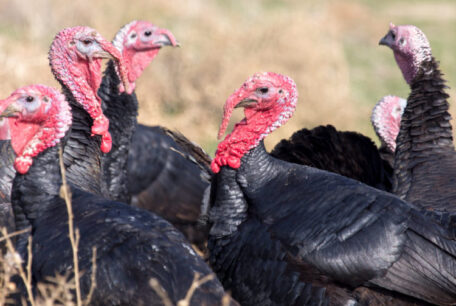Why Eat Veggie?
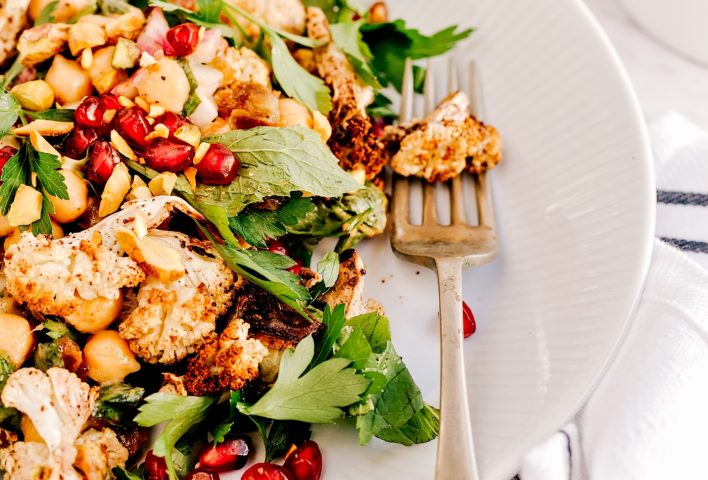
What’s so great about eating veggie food? Whether it’s for animals, people or the planet, there are many reasons to eat vegetarian for yourself and others.
Planet
Vegetarian food has a much lower impact on our environment.
Eating a vegetarian diet is one of the best things you can do to stop climate change – it’s also delicious and can make you feel great!
The population is set to rise to around 9.7 billion by 2050[1] and we are consuming the planet’s natural resources faster than the Earth can replenish them. Without change, by 2050, we’ll need the equivalent of three planets’ resources[2] to meet our current needs.
Reduce Carbon
Our planet is heating up. By replacing meat with vegetarian sources of protein, (nuts, seeds, beans and lentils, for example), we can reduce carbon and other greenhouse gas emissions. The whole food production process of farm-to-plate totals 26% of all global greenhouse gas emissions[3]
Save Emissions
By eating vegetarian food for a year you could save the same amount of emissions as taking a small family car off the road for 6 months[4]. You might not be able to stop using your car in day-to-day life, but you can offset a significant amount of those emissions by choosing to eat veggie food.
Land and Water
More agricultural land is used to raise cattle than all other domesticated animals and crops combined[5]. A vegetarian diet requires two-and-a-half times less the amount of land needed to grow food, compared to a meat-based diet[6]. Livestock in the UK eat more than half of the 20 million tonnes of cereal consumed. That’s over 50% of wheat and 60% of barley.[7]

Reduce carbon
Eating a veggie diet means 2.5 x less carbon emissions than a meat diet. [8]
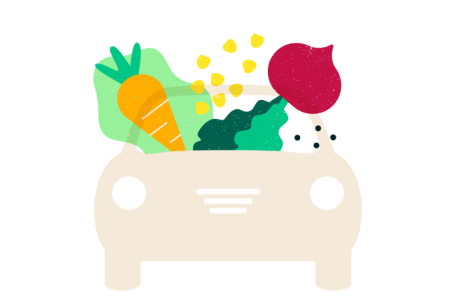
Save emissions
Eating vegetarian for a year saves emissions equivalent to taking a small car off the road for 6 months. [4]

Water
A chicken breast takes over 735 litres of water to produce, that could fill up your bathtub 4.6 times. [9]
Health
Vegetarian food can be really good for your health.
As a vegetarian, eating a balanced diet based on whole grains, pulses (beans and lentils), vegetables and fruits, nuts and seeds you should easily exceed the guidelines for eating 5-A-Day. Even better – your meals will tend to be naturally higher in fibre and lower in saturated fat.
If you want to be sure you are eating a healthy diet, we want to help you with clear, up-to-date dietary guidance based on official UK nutritional recommendations [10]. A vegetarian diet can meet the nutritional needs for people of all ages if you follow a few simple steps [11].
If you’d like to know more about nutrition on a vegetarian diet, head over to our nutrition advice section.
Animals
Vegetarian food is better for animals.
In the UK alone, over two million land animals are slaughtered daily and almost 600,000 tonnes of fish are killed each year.
70%
7 out of 10 pigs reared in the UK are farmed intensively
x3
Birds factory farmed today grow three times as fast as they did 50 years ago.
50%
Half of the fish consumed today are reared intensively on fish farms, where they suffer increased stress and disease.
In the UK alone, over two million land animals are slaughtered daily and almost 600,000 tonnes of fish are killed each year.
Pigs
70% of pigs reared in the UK are farmed intensively. These intelligent and inquisitive animals are forced to live entirely indoors, in over-crowded sheds that do not allow them to express natural behaviours, such as foraging and nest-building.
Intensively-reared sows give birth and raise their young in farrowing crates. These metal crates are so small that sows cannot turn around or suckle their piglets.
Birds
Birds factory farmed today grow three times as fast as they did 50 years ago. Broiler chickens have been selectively bred and reared for their meat. The majority live in large, crowded, windowless sheds with tens of thousands of other birds.
Sheep
Most sheep are not farmed intensively, but they still suffer. Diseases such as lameness, mastitis, sheep scab, pneumonia and hypothermia are common. Sheep may be transported considerable distances to slaughter; and some journeys last 24 hours or more.
Cows
Calves have to endure castration, disbudding and dehorning. Many beef cattle are housed in pens on concrete or slats without bedding.
Fish
Fish do feel pain. Almost half of the fish we consume today are reared intensively on fish farms, where they suffer increased stress and disease.
When wild fish are caught and hauled to the surface, decompression can cause their eyes to pop out and their stomachs to be pushed out through their mouths.
References
[1] United Nations population stats 2019. https://population.un.org/wpp/Publications/Files/WPP2019_Highlights.pdf
[2] Mike Berners-Lee et al. (2018). Current global food production is sufficient to meet human nutritional needs in 2050 provided there is radical societal adaptation. Elem Sci Anth. 6. 52. 10.1525/elementa.310.
https://online.ucpress.edu/elementa/article/doi/10.1525/elementa.310/112838/Current-global-food-production-is-sufficient-to
[3] Poore, J and Nemecek, T (2018). Reducing food’s environmental impacts through producers and consumers.
https://science.sciencemag.org/content/360/6392/987
[4] “A family running a 10-year-old small family car for 6,000 miles (annually) has a carbon footprint of 2,440kgCO2e (Carbon Footprint. Carbon footprint calculator. www.carbonfootprint.com/calculator.aspx Accessed 2021), roughly equivalent to the annual carbon saving of two high meat-eating adults moving to a vegetarian diet.”
[5] Hannah Richie 2017, based on study by Alexander, P, Brown, C, Arneth, A, Finnigan, J & Rounsevell, M 2016, ‘Human appropriation of land for food: The role of diet’, Global Environmental Change, vol. 41, pp. 88-98.
https://ourworldindata.org/agricultural-land-by-global-diets
https://doi.org/10.1016/j.gloenvcha.2016.09.005
[6] World Wide Fund for Nature https://www.wwf.org.uk/
[7] Agriculture and Horticulture Development Board (AHDB) UK annual supply and demand estimates 2021. https://projectblue.blob.core.windows.net/media/Default/MI%20Reports/BST/UK%20Supply%20and%20Demand/202021/202021%20-%20May%20update.pdf
[8] “After adjustment for sex and age, an average 2,000 kcal high meat diet had 2.5 times as many GHG emissions than an average 2,000 kcal vegan diet.”
Scarborough, P., Appleby, P.N., Mizdrak, A. et al. Climatic Change (2014) 125: 179.
https://doi.org/10.1007/s10584-014-1169-1
[9] Based on data from the Water Footprint Network 2021. https://waterfootprint.org/en/resources/interactive-tools/product-gallery/
The global average water footprint of chicken meat is 4325 litres per kg. Comparison is of a 170g chicken breast against a standard bathtub size of 160 litres, which gives x4.6 difference. The Water Footprint Network’s figures are based study by Mekonnen, M.M. and Hoekstra, A.Y. (2012) A global assessment of the water footprint of farm animal products, Ecosystems, 15(3): 401-415.
[10] The Vegetarian Society dietary values for foods are taken from the Composition of Foods by Widdowson McCance as used by the government Food Standards Agency and TSO publications.
[11] The Association of UK Dietitians (BDA) states a well-planned vegetarian diet is appropriate for all stages of life and has many benefits. https://www.bda.uk.com/resource/vegetarian-vegan-plant-based-diet.html

EXPLORE OUR RECIPES
Discover a world of vegetarian inspiration
